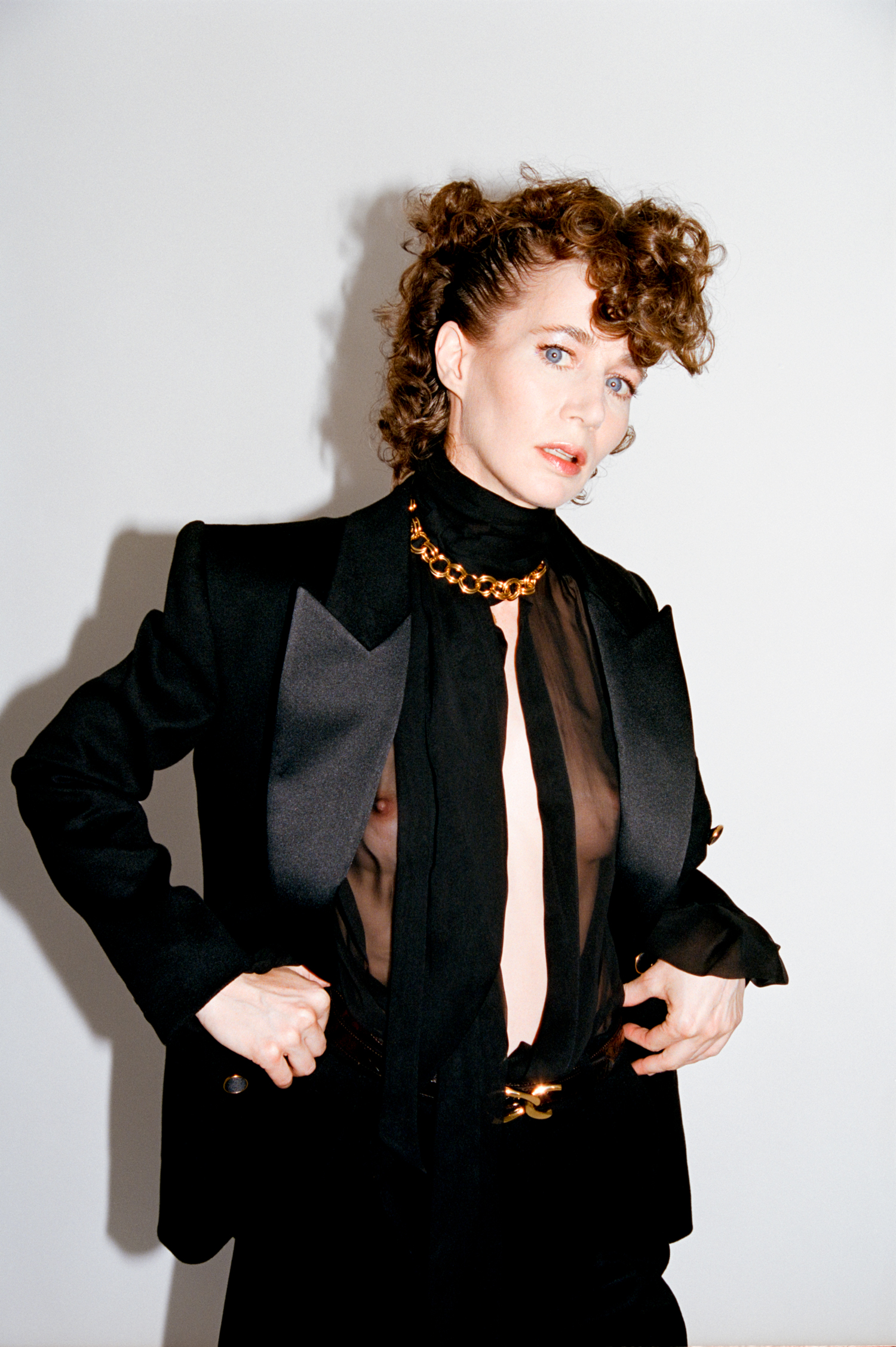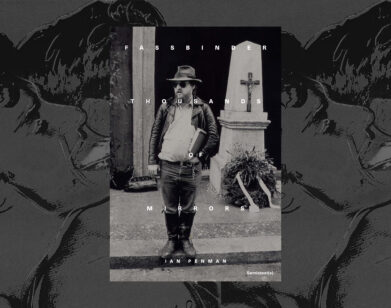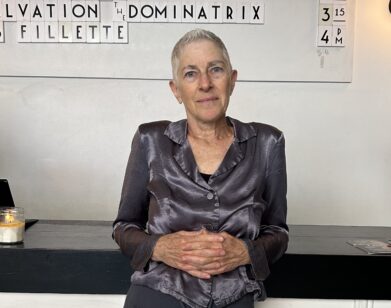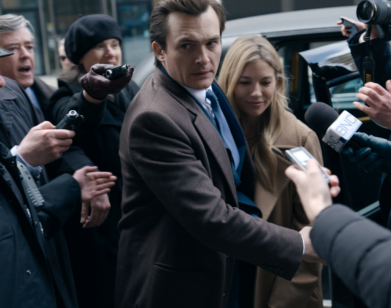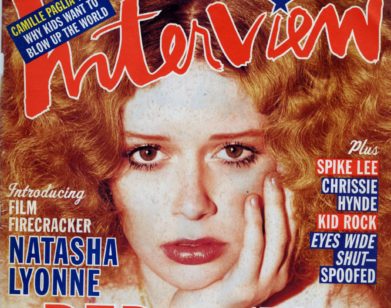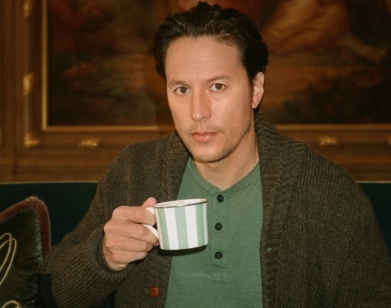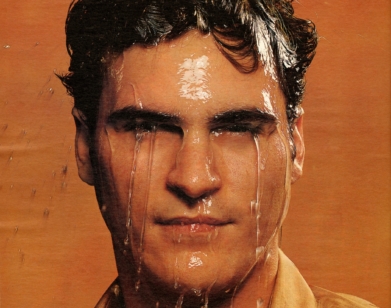Q&A
Miranda July Wants to Dream the Same Dream As You
I know Miranda July because of Rihanna. When, in 2015, I was working at T, the New York Times Style Magazine, and looking for someone to interview the pop star and business mogul, I knew July was the person to do it. As a fan of her live performances, her films Me and You and Everyone We Know and The Future, and her novel The First Bad Man, I was confident that she could tear down the tired trope of a celebrity profile, or at least chip away at the shellack of it all. When July turned in the piece, it was, joyously, as much about Oumarou Idrissa, the Uber driver who took her to the interview, as it was about Rihanna. As she tends to do, July reinvented the genre, not that this should come as a surprise to anyone who has been paying attention.
In her latest film, Kajillionaire, a family of con-artists (Richard Jenkins, Debra Winger, and Evan Rachel Wood) heist their way through life until a fissure forms between the old way of doing things and the way things could be done. It is, among many other things, a metaphor for generational dissent, of breaking from tradition and expectation and customs that just don’t work anymore, and even though it’s her first time not starring in a movie she’s directed, it just might be the most autobiographical thing she’s ever done.
I spoke to July for our September issue about her years-long friendship and gift exchange with a man in her neighborhood named Juan, but we also spoke at length about Kajillionaire, so we decided to publish that, too.
———
NICK HARAMIS: Miranda, hi!
MIRANDA JULY: Nick! How are you?
HARAMIS: I’m good. It’s been a while. I’m just… here.
JULY: Me, too. Just forever here.
HARAMIS: You are not just there. I’ve been following your Instagram awards shows and scavenger hunts, and I rewatched Kajillionaire last night. I’m curious to know how your relationship to the movie has changed, if at all, since you shot it. The world is different.
JULY: When you said you’d watched it again, my inclination was to ask, “How is it doing? I haven’t talked to it since quarantine.” It would be hard to get me to watch any of my movies once I’m done, but I have been thinking about this one, remembering back to when I was writing it, trying at the time to get across this sense of anxiety, and the earthquake in the movie seeming like a way to do that. The idea of a big one, the big one. And now I’m like, “Oh, we’re in the big one.” I guess I sort of hope that the scene where Evan’s character comes out of the bathroom and is transformed, well, I want us all to come out of the bathroom one day and into the light, and for everything in the mini-mart to seem delicious and amazing and to shake someone’s hand for too long. I wonder what it’ll be like for people watching on their laptops.
HARAMIS: The title of the movie, Kajillionaire, is a word that my family and I, who did not grow up wealthy, used to describe money beyond our wildest dreams.
JULY: My feeling is that, regardless of how we grew up socioeconomically, most of us grew up sort of siloed. We grew up within these constructions that we couldn’t really see were constructions—they seemed like the whole world. I guess I leaned into the righteousness that arises when we’re siloed in that way. There’s a nasty, villainous, slightly evil righteousness to this particular family, but I think even the most well-meaning righteousness ultimately fails children. I mean, your parents will have misinformed you because they can only speak about life as they knew it, and you will betray them because you will not continue to live the way that you once lived as a child in that family. The inherent betrayal in that, and the resulting heartbreak, is what I was writing from. I tore through the first draft of the script never once thinking about my own family. They’re not literal, but for me they’re more resonant because of that. There’s this kind of ache.
HARAMIS: As someone who has been to your live performances, read your books, and owns your monograph, it hadn’t occurred to me at first that you might be wrestling with your own relationships.
JULY: I guess what I’m saying is, I constructed an entire fiction, pretty much finished writing it, thinking, “Wow, this is crazy. I wrote a heist movie”—albeit my own gay, weird version of it. And, like you were saying, it felt pretty far afield of my own life. And then I had this sickening feeling of, “The heist you pulled was really on yourself.” I was entertained enough to write it, and then it kind of punched me in the gut. For me, when fiction works, when fiction really sort of takes flight, the hope is that you lose yourself, or the idea of yourself, enough to get underneath it into the real mysteries.
HARAMIS: I sort of like and dislike the characters in this film in equal measure. What’s your relationship to them?
JULY: When I’m writing, I don’t take a moral point of view. As soon as you do that, the characters die. And when I’m directing, I’m doing so with a bunch of actors who are playing very three-dimensional, heartfelt versions of these people, so it’s not useful to them to hear the condemnation. That said, I enjoy that the parents are pretty fucked-up. I did not write an ode to parents, and I am one, so there is some sort of recognition that it doesn’t always go well. Your legacy may not go down right. The scenes in which I think the parents are the most despicable or creepy, like the hot tub scene, I really enjoyed. It really scratched some kind of deep itch to get the ickiness right while still always being able to imagine it from their point of view, how everything could have made sense to them.
HARAMIS: Which is your favorite era of Evan Rachel Wood?
JULY: For some reason I’m blanking on the… what’s the Todd Haynes show?
HARAMIS: Mildred Pierce? I’m a Pretty Persuasion kind of guy.
JULY: To be honest, when we met, I didn’t know if she could really do this. I mean, I thought she could, but I wasn’t totally sure. We were at dinner, and I remember her saying that [her character in Kajillionaire] Old Dolio reminded her of her favorite character in all of film history. I thought, “I’m not a great cinephile. I hope I can catch this reference.” And then she said Edward Scissorhands. First of all, I was pleased that I knew who Edward Scissorhands was, and then I just thought it was so spot-on that I was like, “Done.”
HARAMIS: Between Me and You and Everyone We Know and No One Belongs Here More Than You and It Chooses You, there’s a tendency in your work to implicate the audience, to turn the mirror toward the spectator. Where does that come from?
JULY: Even though I wanted to be a director from the beginning, what was available to me was doing things live, so that is how I began. That means that, from the get-go, you’re working with the present moment as the medium, and the people are really there, and you’re accountable to them. There’s something sort of embarrassing about that. Film has this passive coolness to it. You can just be along for the ride. I don’t think that was ever the great appeal of it to me, which is why the history of film isn’t… it’s not the thing that made me want to be a filmmaker. I’m coming from this other place of, “I want to make a world and I want to get to dream the same dream as someone.” That was always the most romantic idea to me. Sometimes when we’re going to sleep, I’ll say to Mike [Mills, July’s husband], “Let’s dream the same dream,” like we’re going to see each other there. Sometimes you can have that when you’re falling in love. Or you can have it dancing with someone, if the music is really, really loud. It’s almost like the fabric of the dream that you’re in. There’s just art that has a fighting chance to do that.
And so, I never want to lose the person, because the whole point is that I’m in there with them. I’m not alone in there. I’m not presenting something to you. You’re in there with me. I remember specifically with Me and You and Everyone We Know, wanting to have my character be an artist who was making things, to almost wink at the audience and say, “Yeah, and I made this. This whole thing that you’re watching. She didn’t just make the video art in this movie that her character makes.” Just to indicate that there was a process there. It wasn’t magical. It wasn’t impossible. It was trial and error. It was striving. And you can do it, too.
HARAMIS: I’ve always found you to be a very tactile artist in mediums that don’t often require or encourage tactility. In The Future, there’s this whole sense of needing to get off the computer and into the real world. And in Me and You and Everyone We Know, the scene that really stuck out for me was not in fact “poop back and forth forever,” but the one where your character goes to the museum to deliver the video art that you’ve made, and the employee there tells you to drop it in the mail. And you’re like, “But I’m right here. It’s right here in my hands.” Even your new book has a hole in it. By drawing attention to tactility in an often touchless world, especially right now, I can’t help but think you’re inspiring people to use their hands to make their own stuff.
JULY: I don’t want you to forget that you have a body. I want you to remember to use that body. That body is invited to this party I’m throwing.
HARAMIS: Speaking of your body, how are you feeling about the circumstances of this movie’s release? How’s your heart?
JULY: It’s changed so much. There was the initial disappointment, like, “Are you kidding me? We were supposed to go to Cannes. My crew hasn’t even seen this movie.” Basic stuff like that. But then, to be honest, I’ve been doing all these Black Lives Matter–related things, and now it’s like the kaleidoscope has turned. It’s not that it doesn’t still seem important, but there are so many things that are important right now that don’t have to do with the movie. As a woman filmmaker, I often have this feeling like every odd is against me. That’s not untrue, but it’s not the only battle. And so, my ambition is being allocated a bit differently right now, and I did not see that coming.
HARAMIS: I think so many people who work in creative fields have been forced to look at what they do in light of these two monumental crises we have been facing. In my own way, I kept thinking, “I make an entertainment and art magazine. What could be more useless in this exact moment?” But then I kind of pulled back a bit and thought about the conceit of this publication—bringing together creative people from different worlds and letting them talk—and I thought, “Well, actually, what could be more useful than that?” I know I keep coming back to something as stupid as Instagram, but you’ve rethought how to use that platform in a way that I think is important because it allows you to communicate with people who otherwise wouldn’t have access to you and your ideas, and vice versa. And I see you engaging with people, encouraging them, teaching them in a way that’s not didactic, but that feels like an extension of the work you would otherwise already be doing. What I’m trying to say is, it’s nice. I’ve found it hopeful to see people not just changing the stuff they make, but changing the way they think about that stuff.
JULY: I remember going to my first meeting at Focus, the company that’s distributing the movie, which turned out to be my only meeting at Focus, the only time I would ever sit with all these people who I’m working with, and I said, “I just want to throw out the idea that there is one version of this movie that’s about a generation, these Boomers righteously defending their crumbling infrastructure even though it doesn’t work at all and makes no sense, and that there’s nothing you can do to change them. All you can do is start your own thing. You will die trying to fight them. All you can do is start anew.” It’s not the heart of the movie, but I feel like it’s no longer so buried.

